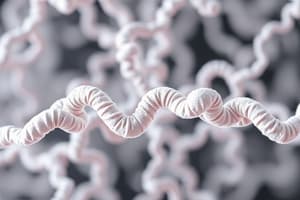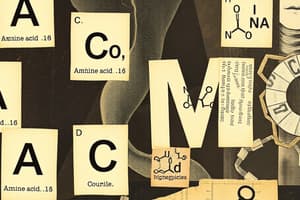Podcast
Questions and Answers
What characteristic defines L isomers of amino acids?
What characteristic defines L isomers of amino acids?
- The amino group is on the left. (correct)
- The R group is a carboxylic acid.
- The amino group is on the right.
- The carboxylate group is on the bottom.
Which type of R group would classify an amino acid as nonpolar?
Which type of R group would classify an amino acid as nonpolar?
- Contains amide groups (-CONH2).
- Contains alkyl or aromatic groups. (correct)
- Contains carboxylate groups (-COO-).
- Contains hydroxyl groups (-OH).
What distinguishes polar neutral amino acids from other types?
What distinguishes polar neutral amino acids from other types?
- They contain hydroxyl, thiol, or amide groups. (correct)
- They lack any functional groups.
- They contain carboxylate groups.
- They have R groups that are hydrophobic.
Why are D amino acids not incorporated into proteins in biological systems?
Why are D amino acids not incorporated into proteins in biological systems?
How does the R group in amino acids affect their properties?
How does the R group in amino acids affect their properties?
What is a common feature of polar acidic amino acids?
What is a common feature of polar acidic amino acids?
What is the function of the α-carbon in amino acids?
What is the function of the α-carbon in amino acids?
What structural feature differentiates polar amino acids from nonpolar amino acids?
What structural feature differentiates polar amino acids from nonpolar amino acids?
What is the primary function of proteins in biological systems?
What is the primary function of proteins in biological systems?
Which group in amino acids ionizes to form a negatively charged species at physiological pH?
Which group in amino acids ionizes to form a negatively charged species at physiological pH?
What unique characteristic do all α-amino acids have except glycine?
What unique characteristic do all α-amino acids have except glycine?
What term describes an ionized amino acid that has both a positive and a negative charge?
What term describes an ionized amino acid that has both a positive and a negative charge?
Which element is NOT a component of an amino acid's structure?
Which element is NOT a component of an amino acid's structure?
What defines the R group in an amino acid?
What defines the R group in an amino acid?
Which of the following best explains how amino acids form proteins?
Which of the following best explains how amino acids form proteins?
How many different amino acids are present in human proteins?
How many different amino acids are present in human proteins?
What happens to an amino acid when the solution's pH is more acidic than its isoelectric point (pI)?
What happens to an amino acid when the solution's pH is more acidic than its isoelectric point (pI)?
At what pH does alanine form its zwitterion?
At what pH does alanine form its zwitterion?
What is the pI range for polar basic amino acids?
What is the pI range for polar basic amino acids?
What occurs to the carboxylic acid group in zwitterions of polar acidic amino acids at pH 3?
What occurs to the carboxylic acid group in zwitterions of polar acidic amino acids at pH 3?
What is true about a zwitterion?
What is true about a zwitterion?
Which of the following amino acids would likely have a pI value less than 5.1?
Which of the following amino acids would likely have a pI value less than 5.1?
In solutions more basic than its pI, what form does an amino acid take?
In solutions more basic than its pI, what form does an amino acid take?
Which of the following statements is true regarding nonpolar amino acids?
Which of the following statements is true regarding nonpolar amino acids?
What type of bond is formed between the –SH groups of cysteine amino acids?
What type of bond is formed between the –SH groups of cysteine amino acids?
Which interactions stabilize the tertiary structure of globular proteins?
Which interactions stabilize the tertiary structure of globular proteins?
Which component of hemoglobin is essential for its oxygen-carrying function?
Which component of hemoglobin is essential for its oxygen-carrying function?
What type of interaction occurs between polar basic (–NH3+) and polar acidic (–COO-) R groups?
What type of interaction occurs between polar basic (–NH3+) and polar acidic (–COO-) R groups?
Which characteristic defines globular proteins?
Which characteristic defines globular proteins?
Which protein primarily functions in oxygen transport in the blood?
Which protein primarily functions in oxygen transport in the blood?
What type of amino acid group undergoes hydrophilic interactions with water?
What type of amino acid group undergoes hydrophilic interactions with water?
In myoglobin, what secondary structure predominantly consists of the amino acid chain?
In myoglobin, what secondary structure predominantly consists of the amino acid chain?
What happens to the amino group of amino acids with a pH lower than their pI?
What happens to the amino group of amino acids with a pH lower than their pI?
What characterizes a peptide bond?
What characterizes a peptide bond?
How is the N-terminal amino acid defined in a peptide?
How is the N-terminal amino acid defined in a peptide?
What is the naming convention for amino acids in a peptide?
What is the naming convention for amino acids in a peptide?
What determines the overall charge of alanine when the pH is below its pI?
What determines the overall charge of alanine when the pH is below its pI?
Which of the following correctly describes glycine in a peptide structure?
Which of the following correctly describes glycine in a peptide structure?
In the tripeptide sequence 'Gly-Ser-Met', what is the C-terminal amino acid?
In the tripeptide sequence 'Gly-Ser-Met', what is the C-terminal amino acid?
What is the significance of the zwitterion form of amino acids in peptide formation?
What is the significance of the zwitterion form of amino acids in peptide formation?
Flashcards are hidden until you start studying
Study Notes
What is a Protein?
- Derived from the Greek word "proteios," meaning "first."
- Proteins are large, complex molecules composed of amino acids linked by peptide bonds.
- Proteins perform a variety of functions in the body.
What is an Amino Acid?
- Fundamental building blocks of proteins.
- Human proteins contain 20 different amino acids.
Ionization of Amino Acids
- Amino acids have an amino group (−NH2) and carboxylic acid group (−COOH).
- At physiological pH, amino groups ionize to form −NH3+; carboxylic acid groups lose H+ to become −COO−.
- Ionized amino acids, known as zwitterions, carry both positive and negative charges but have an overall neutral charge.
Amino Acid Stereoisomers
- All α-amino acids except glycine are chiral and can exist in D and L forms.
- Biological proteins exclusively use L isomers.
Classification of Amino Acids
- Nonpolar Amino Acids: Hydrophobic R groups, include hydrogen, alkyl, or aromatic groups.
- Polar Amino Acids: Hydrophilic R groups that interact with water; categorized into:
- Polar Neutral: Contain -OH, -SH, or -C(O)NH2 groups.
- Polar Acidic: R groups with a carboxylate (−COO−).
- Polar Basic: R groups with amino groups that ionize to form ammonium.
Essential Amino Acids
- Specific amino acids that must be obtained through diet, as the body cannot synthesize them.
Ionized Forms of Amino Acids
- Zwitterions form at the isoelectric point (pI), which varies for each amino acid.
- Amino acids can exist in different charged states depending on the pH:
- Positive ion in acidic conditions (pH < pI).
- Negative ion in basic conditions (pH > pI).
- Polar acidic amino acids (e.g., aspartic acid, glutamic acid) have pI around pH 3.
- Basic amino acids (e.g., lysine, arginine) have pI values typically above pH 7.6.
Formation of Peptides
- Peptide bonds (amide bonds) form when the carboxyl group of one amino acid reacts with the amino group of another.
- Peptides consist of two or more amino acids linked by peptide bonds.
- The first amino acid in a peptide is the N-terminal and the last is the C-terminal (e.g., alanylglycylserine for a tripeptide).
Structural Interactions in Proteins
- Disulfide Bonds: Covalent links between –SH groups of cysteine residues.
- Hydrophilic Interactions: Polar amino acids are attracted to the aqueous environment, positioning themselves outward in globular proteins.
- Salt Bridges: Ionic interactions between charged R groups of acidic and basic amino acids.
Characteristics of Globular Proteins
- Compact, spherical shapes due to folding of the polypeptide chain driven by R group interactions.
- Hemoglobin consists of four polypeptide chains, crucial for oxygen transport in the blood.
- Myoglobin, composed of a single chain and primarily α-helix structure, stores oxygen in muscles.
Studying That Suits You
Use AI to generate personalized quizzes and flashcards to suit your learning preferences.




